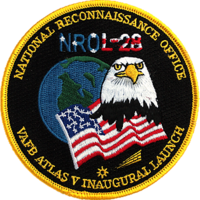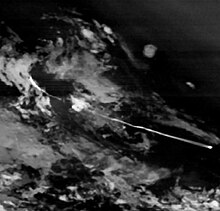USA-200
 | |
| Names | NROL-28 |
|---|---|
| Mission type | SIGINT |
| Operator | United States NRO |
| COSPAR ID | 2008-010A |
| SATCAT no. | 32706 |
| Start of mission | |
| Launch date | 13 March 2008, 10:02 UTC |
| Rocket | Atlas V 411 (AV-006) |
| Launch site | Vandenberg, SLC-3E |
| Contractor | Lockheed Martin Commercial Launch Service |
| Orbital parameters | |
| Reference system | Geocentric orbit[1] |
| Regime | Molniya orbit |
| Perigee altitude | 1,112 km (691 mi) |
| Apogee altitude | 37,580 km (23,350 mi) |
| Inclination | 63.56° |
| Period | 684.33 minutes |
| Instruments | |
| Space-Based Infrared System (SBIRS-HEO 2) Magnetospheric science instrument (TWINS-B) | |
 NROL-28 mission patch | |
USA-200, also known as NRO Launch 28 or NROL-28, is an American signals intelligence satellite, operated by the National Reconnaissance Office. Launched in 2008, it has been identified as the second satellite in a series known as Improved Trumpet, Advanced Trumpet, or Trumpet follow-on; a replacement for the earlier Trumpet series of satellites.[2]

Launch
[edit]USA-200 was launched by an Atlas V launch vehicle, flying in the 411 configuration, operated by United Launch Alliance. The launch vehicle was the first Atlas V to launch from Vandenberg Air Force Base, flying from Space Launch Complex 3E.[3] Liftoff occurred at 10:02 UTC on 13 March 2008.[4][5] It was identified as NRO Launch 28,[6] and was the thirteenth flight of an Atlas V. The launch vehicle had the tail number AV-006.[4]
Orbit
[edit]The satellite's orbit and mission are officially classified, however like most classified spacecraft it has been located and tracked by amateur observers. It is in a Molniya orbit with a perigee of 1,112 km (691 mi), an apogee of 37,580 km (23,350 mi), and 63.56° of orbital inclination and 684.33 minutes of orbital period.[1]
Instruments
[edit]In addition to its SIGINT payload, USA-200 also carries two secondary instruments; the SBIRS-HEO 2 missile detection payload as part of the Space-Based Infrared System programme, and NASA's TWINS-2 or TWINS-B magnetospheric science instrument as part of the TWINS programme.[2]
See also
[edit]References
[edit]- ^ a b "Satellite Catalog". Jonathan's Space Report. 21 July 2021. Retrieved 19 December 2021.
- ^ a b Krebs, Gunter. ""Trumpet F/O" 1, 2, 3". Gunter's Space Page. Retrieved 11 April 2012.
- ^ Ray, Justin (13 March 2008). "Atlas 5 rocket launches from California for first time". Spaceflight Now. Retrieved 11 April 2012.
- ^ a b McDowell, Jonathan (15 December 2021). "Launch Log". Jonathan's Space Report. Retrieved 19 December 2021.
- ^ Ray, Justin (13 March 2008). "Atlas Launch Report - Mission Status Center". Spaceflight Now. Retrieved 11 April 2012.
- ^ Krebs, Gunter. "NROL launches". Gunter's Space Page. Retrieved 11 April 2012.
